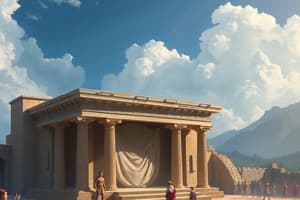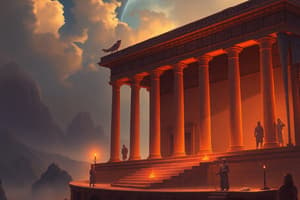Podcast
Questions and Answers
What is the primary source of knowledge on the question of the origin of the word tragedy?
What is the primary source of knowledge on the question of the origin of the word tragedy?
- Friedrich Nietzsche's analysis
- The Great Dionysia
- The Poetics of Aristotle (correct)
- The surviving works of Aeschylus, Sophocles, and Euripides
What is the structure of Greek tragedy characterized by?
What is the structure of Greek tragedy characterized by?
- A flexible and improvisational approach
- A focus on individual expression
- A lack of structure
- A set of conventions (correct)
What are the three Aristotelian unities of drama?
What are the three Aristotelian unities of drama?
- Setting, tone, and mood
- Plot, character, and theme
- Time, place, and action (correct)
- Time, space, and emotion
What was the role of the audience in a Greek Tragedy?
What was the role of the audience in a Greek Tragedy?
What is Deus Ex Machina?
What is Deus Ex Machina?
Which festival featured a contest between three plays, chosen by the archon eponymous, with each tetralogy recited in one day?
Which festival featured a contest between three plays, chosen by the archon eponymous, with each tetralogy recited in one day?
What is the contrast between the Dionysian and Apollonian elements of tragedy highlighted by Friedrich Nietzsche?
What is the contrast between the Dionysian and Apollonian elements of tragedy highlighted by Friedrich Nietzsche?
What is the technique used in many of Aeschylus' plays, such as Prometheus Bound?
What is the technique used in many of Aeschylus' plays, such as Prometheus Bound?
What is the dialect used in Greek tragedy for the parts spoken or recited by individual characters?
What is the dialect used in Greek tragedy for the parts spoken or recited by individual characters?
Study Notes
Greek Tragedy: A Form of Theatre from Ancient Greece
-
Greek tragedy is a form of theatre from Ancient Greece and Greek inhabited Anatolia.
-
Tragic plots were most often based upon myths from the oral traditions of archaic epics.
-
The most acclaimed Greek tragedians are Aeschylus, Sophocles, and Euripides.
-
Greek tragedy is believed to be an extension of the ancient rites carried out in honor of Dionysus.
-
Tragedy heavily influenced the theatre of Ancient Rome and the Renaissance.
-
The origin of the word tragedy has been a matter of discussion from ancient times.
-
The primary source of knowledge on the question is the Poetics of Aristotle.
-
Aristotle was able to gather first-hand documentation from theater performance in Attica.
-
The structure of Greek tragedy is characterized by a set of conventions.
-
The Greek dialects used are the Attic dialect for the parts spoken or recited by individual characters, and a literary Doric dialect for the chorus.
-
Aristotle asserted that a play must be complete and whole, in other words, it must have unity.
-
The three Aristotelian unities of drama are the unities of time, place and action.Greek Tragedy: A Summary
-
Greek tragedy was a popular form of theatre in ancient Greece, with key elements including a three-act structure, unity of time, place, and action.
-
Friedrich Nietzsche highlighted the contrast between the Dionysian and Apollonian elements of tragedy.
-
Greek tragedy was a collective ritual of the polis, with performances taking place in a sacred, consecrated space, voicing ideas and problems from Athenian society.
-
The Great Dionysia was a festival where a contest between three plays took place, chosen by the archon eponymous, with each tetralogy recited in one day.
-
Of the many tragedies known to have been written, just 32 full-length texts by only three authors, Aeschylus, Sophocles and Euripides, survive.
-
The role of the audience in a Greek Tragedy was to become part of that theatrical illusion, to partake in the act as if they were part of it.
-
The chorus was often of one type of social position (in both age, gender, nationality, and class), with the citizen chorus being distinguished by status and seen as a subset of the demos.
-
Greek tragedy was performative and not an attempt to approach Greek tragedy through context, with the origins based on song or speech rather than written script.
-
Deus Ex Machina is a technique in which an action is halted by the appearance of an unforeseen character or through the intervention of a god, that essentially brings about a conclusion to a play.
-
Character identification can be seen in many of Aeschylus' plays, such as Prometheus Bound.
-
Of the many tragedies known to have been written, just 32 full-length texts by only three authors, Aeschylus, Sophocles and Euripides, survive.
-
The surviving works of Aeschylus include the Oresteia, Sophocles wrote seven plays, and Euripides wrote eighteen tragedies and the only complete surviving satyr play, the Cyclops.
Studying That Suits You
Use AI to generate personalized quizzes and flashcards to suit your learning preferences.
Description
Think you know everything about Greek tragedy? Test your knowledge with our quiz on this ancient form of theatre. From the origins of tragedy to the famous playwrights such as Aeschylus, Sophocles, and Euripides, this quiz will challenge your understanding of this influential art form. Get ready to dive deep into the structure, conventions, and themes of Greek tragedy and see how much you really know.




